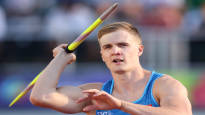Javelin man Julian Weber is the first German to know today how the Finnish racing brothers have felt in recent years, writes journalist Atte Husu.
BUDAPEST. 1999, 2003, 2007, 2009 and 2019.
The reading sequence tells about the years in which the men’s javelin has been held on the last day of the World Championships and Finland’s medal balance has been around zero before the start of the javelin final. The same starting situation has been at the EC level once, in 2014.
The Finnish javelin man has endured statistically well under pressure: three out of six times have resulted in a gold medal.
On Sunday, in the World Cup final, the blue and white javelin tradition will be represented alone With Oliver Helander doesn’t have the same pressure on their shoulders, thanks to the pole vault bronze medalist on Wednesday Wilma Murron.
Instead, the reigning European champion Julian Weber will be on uncharted territory on Sunday as far as the German javelin thrower is concerned.
Since the fall of the Iron Curtain, unified Germany has been the European power house of athletics, whose athletes have won a total of 123 medals in 16 World Championships – that is, an average of just under eight medals per World Championships.
Before the closing day of the Budapest Games, Germany’s medal balance shows a round zero.
The favorite collapsed
Maybe the straight statistics miracle had no effect, but the pressure situation crept into my mind on Saturday morning at the Budapest stadium, when the decathletes opened their second day of competition.
The statistical leader of the season Leo Neugebauer set the pace for 9,000 points on Friday, but the 23-year-old German’s Saturday was ruined literally as soon as he shook hands: Neugebauer crashed into the first fence at the 110-meter fence.
The hit started a via dolorosa, the kind that doesn’t immediately come to mind in the fences of value matches.
The gold and lesser medals escaped when Neugebauer was unable to break the negative cycle that started at the fences.
The fact that the German World Cup team’s medal account had not been opened before the weekend is not sensational news in itself.
Already at last year’s World Championships in Oregon, the team got only two medals, Malaika Mihambon the long distance gold and the women’s relay bronze, which came on the last weekend of the Games.
When this year’s team arrived in Budapest, there were two athletes in the statistics who were in the top three of their sport in the season’s world statistics. Of these two match ball athletes, Neugebauer has already been seen, Weber is still left on Sunday.
Based on statistics, Weber has five main opponents. One is Oliver Helander. of India Neeraj Chopra and the Czech Republic Jakub Vadlejch are the number one favorites for the race, which in order to win Weber has to withstand the pressure of his country’s athletics crowd Aki Parviainen, Tero Pitkämäki and Antti Ruuskanen ways.
If this does not happen, Budapest will go down in German athletics history in the same way as Finland did in 1966. At that time, albeit at the European Championship level, the Finnish team was left without medals for the first time.
The situation is special in the sense that a year ago, Germany won the medal statistics of its home European Championships in Munich with seven golds, seven silvers and two bronzes. It says something about the general level of European athletics in global competition arenas.
France in the same state
Like Germany, France will enter the final day without a single World Cup medal.
Arriving in Budapest as the reigning decathlon world champion Kevin Mayer had to leave the game already on Friday, and there is no savior in sight anymore.
France has gone without a medal at the World Cup level only twice, in 1983 and 1993.
If both European superpowers leave the World Championships in Budapest without a single medal, it will deserve its own chapter in the history of athletics.
It would be at least the biggest sensation of these games.
